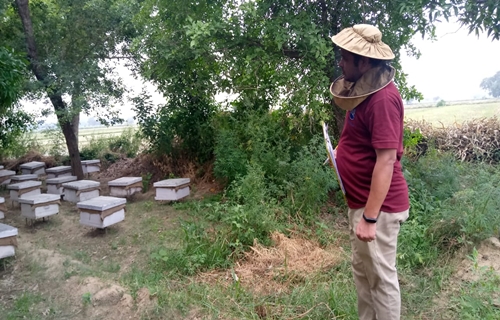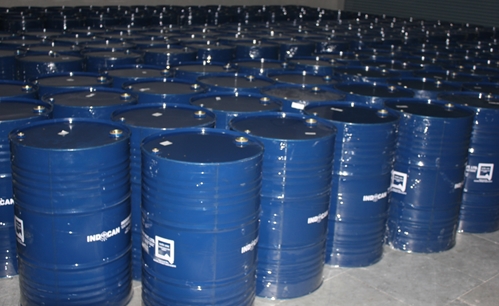Process
The life cycle of honey from collection at farms upto dispatch to customers is carefully managed at IndoCan to ensure hygiene, safety and quality. The entire process comprises of collection, testing, processing (including melting, filtration, homogenisation, and moisture reduction), packing and storage in warehouse. Every process is well defined and documented to ensure adequate controls and exceptional results. IndoCan has multiple internationally recognized certifications i.e. BRC, TSH, FSMA, ISO 2005:22000, Non-GMO which help in strengthening of controls.
Collection

The collection of honey is done either through our own apiaries or through the affiliated 2000+ beekeepers and stockiest. Each batch is serially numbered with details of beekeeper and harvesting location. All the honey collected is transferred to our warehouse and sample is drawn from each bucket to make composite sample. The sample is then sent to our own lab/German lab for testing. Our quality team and veterinary doctor visits the farms regularly to monitor beekeeping practices, use of medicines etc. and to impart training on good beekeeping practices.
Through this process we are able to keep to complete traceability of honey upto beekeeper/farm level and also improve quality of produce from the field. All our collection of honey is from Non-GMO crops.

The collection of honey is done either through our own apiaries or through the affiliated 2000+ beekeepers and stockiest. Each batch is serially numbered with details of beekeeper and harvesting location. All the honey collected is transferred to our warehouse and sample is drawn from each bucket to make composite sample. The sample is then sent to our own lab/German lab for testing. Our quality team and veterinary doctor visits the farms regularly to monitor beekeeping practices, use of medicines etc. and to impart training on good beekeeping practices.
Through this process we are able to keep to complete traceability of honey upto beekeeper/farm level and also improve quality of produce from the field. All our collection of honey is from Non-GMO crops.
Testing – Raw and Finished Honey

Honey received from farms is given unique batch number for identification and composite sample (drawn from each bucket) is sent to our own lab for testing. We conduct Organoleptic sensory evaluation alongwith exhaustive chemical, heavy metal and sugar profile tests to check purity, contamination and compliance to honey standards (Residue monitoring plan. The acceptance of honey is based on the test results after they meet applicable quality norms.
The accepted honey is then used for batch planning on basis of customer requirements (colour, flora, F/G., etc.) and material issued to production for processing. Our standard lot size varies from 20MT to 40MT depending on customer requirements.
De-Crystallization and Filtration

The honey is first melted in melting chambers so that it becomes liquid and is easy to manage. IndoCan has multiple melting chambers of 8MT capacity each to process one lot at once. The chambers are double jacketed with hot RO water flowing at the bottom to indirectly heat the honey. The chambers are also provided with hot air to melt the honey so that it falls on the floor. The temperature in the melting chamber is maintained between 40-45 degreeC so that honey properties are retained.
The honey is then passed through 60 sieve mesh filters to remove any impurities and moved to SS 304 raw tanks.
Moisture Reduction and Homogenisation

The honey from melting chambers is passed to raw SS304 storage tanks of 25MT capacity. The tanks are mounted with stainless steel three blade agitators which are used to homogenise the honey at slow speed. The honey is also circulated from bottom to top in the raw tank to achieve vertical homogenization
The dehumidification / moisture reduction involves reduction of moisture to <19% using heat exchanger and vacuum cone. Honey from raw tank is directly passed through vacuum cone and flow is adjusted using flow meter and valve. The honey from the vacuum cone outlet is checked for moisture to ensure that it is <19%. Then the honey is passed into finished tanks and moisture is checked every 30 minutes to ensure that moisture reduction is being maintained.
Packaging

The honey is kept in 25MT finished tanks for settling and then packed in bulk or retail packs. The bulk packing is done by passing honey through final filter of 80 mesh sieve and using automated filling machine into 50Kg food grade plastic cans or 300Kg epoxy coated MS-drums.
For retails packing, additional de-waxing and filtration is done before filling. We can pack from 5gm to 25Kg food grade pet or glass bottles or buckets using automated filling line into, as per requirement.
Sample is drawn during filling and the same is sent to external lab for final testing.
Warehousing

We have adequate size warehouse wherein the honey is stored after filling till we get finished honey report and it is dispatched as per customer instructions. Ambient temperature is maintained in warehouse and fork-lifts, inventory management system is used for loading and dispatch
